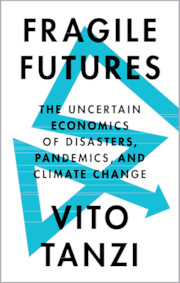Book contents
- Fragile Futures
- Fragile Futures
- Copyright page
- Contents
- Acknowledgments
- Epigraph
- Part I Uncertain Future Events and Reactions to Them
- Part II Pandemics and Other Disasters
- 5 Pandemics, Plagues, and Epidemics
- 6 Famines
- 7 Natural Disasters
- 8 Atomic Disasters
- 9 Industrial Disasters
- 10 Guiding Economic Principles for Disasters
- Part III Climate Change and Global Warming
- Part IV Back to Some Theoretical Issues
- References
- Index
5 - Pandemics, Plagues, and Epidemics
from Part II - Pandemics and Other Disasters
Published online by Cambridge University Press: 28 April 2022
- Fragile Futures
- Fragile Futures
- Copyright page
- Contents
- Acknowledgments
- Epigraph
- Part I Uncertain Future Events and Reactions to Them
- Part II Pandemics and Other Disasters
- 5 Pandemics, Plagues, and Epidemics
- 6 Famines
- 7 Natural Disasters
- 8 Atomic Disasters
- 9 Industrial Disasters
- 10 Guiding Economic Principles for Disasters
- Part III Climate Change and Global Warming
- Part IV Back to Some Theoretical Issues
- References
- Index
Summary
Description: Life on Earth is not always safe and pleasant. History has recorded many pandemics, famines, and national disasters, while at the same time the progress created by the Industrial Revolution led to an increase in life expectancy. Epidemics and pandemics become less frequent in recent centuries, but recently have reappeared, because of increased contacts among people, and more contacts with animals.
The chapter provides brief descriptions of past disasters, including plagues, such as the Attic Plague, the Plague of Antoninus, the Justinian Flea, the Black Plague or Bubonic Plague, and the Great Influenza. It discusses the possible relationship of these plagues to climate changes, caused by major volcanic eruptions. It also discusses some changes that the major plagues may have generated, such as the Renaissance and some government policies. The lack of power by governments to do anything in earlier years is stressed.
- Type
- Chapter
- Information
- Fragile FuturesThe Uncertain Economics of Disasters, Pandemics, and Climate Change, pp. 39 - 58Publisher: Cambridge University PressPrint publication year: 2022

